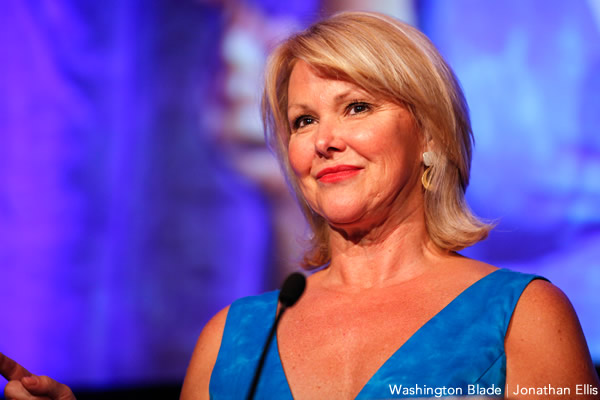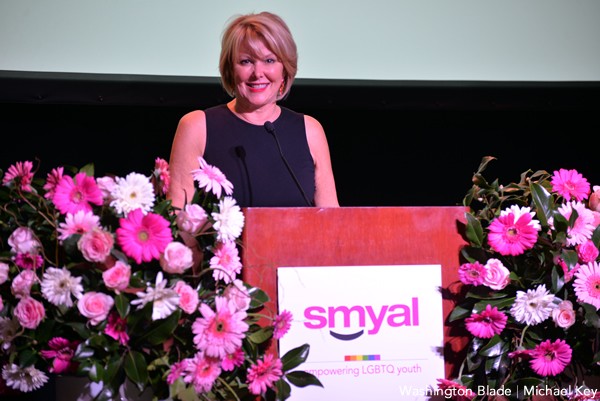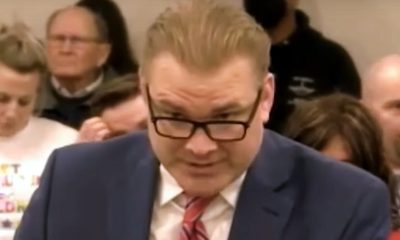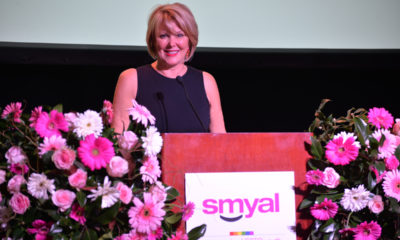Local
Wendy Rieger to retire from NBC4
Long-time anchor champions LGBTQ rights

Long-time NBC4 anchor Wendy Rieger on Dec. 10 announced she will retire after 33 years with the television station.
Rieger in an email to colleagues said her last day will be on Dec. 21, which coincides with the Winter Solstice.
“There is an elegance to the universe if you let it reveal itself,” she wrote. “As a Celtic Pagan, the 21st of December is a high holiday. The Solstice. When I saw two years ago that my contract would be ending on 12/21/2021, there was a perfection to those numbers. It felt like a good time to pull a fresh page from the stack and start writing a new story. Then COVID, and COVID and COVID and the whirl of events that have kept everything swirling around the room these past years.”
She talked about her pending retirement with co-anchor Jim Handly later that day.
“At a certain point, as I used to say to some of my dates, how can I miss you if you won’t leave,” said Rieger as Handly began to laugh. “There’s a certain point where we need new chapters in our lives and we can’t get too attached to something that we’ve done, that we know, that’s become second nature, no matter how much we love it.”
Rieger, who is originally from Norfolk, Va., joined NBC4 in 1988 as a general assignment reporter. She began to anchor the station’s weekend evening newscasts in 1996 and the 5 p.m. broadcasts in 2001.
“When I was here 33 years ago, this was the Land of the Giants in that Jim Vance was here. George Michael was here. Bob Ryan,” Rieger told the Washington Blade on Monday during a telephone interview from NBC4’s Northwest D.C. studios. “You sat on the set with those three and it was like working in a redwood forest, and that was the Era of the Giants.”
Rieger throughout her career has championed the LGBTQ community.
She participated in a number of D.C. AIDS Rides and emceed several SMYAL Fall Brunches.
Rieger in 2017 made a cameo in the Gay Men’s Chorus of Washington’s adaptation of the musical “How to Succeed in Business Without Really Trying.” The Blade in 2015 named Rieger “Best Local TV Personality” for that year’s “Best of Gay D.C.” issue, which featured a cover photo of Rieger straddling a drag queen as she applied lipstick.
Rieger joked that “people at work said we would have liked to have had a heads up that you were going to be straddling the guy.”
“I said, well that was my idea,” she told the Blade. “And when they said they weren’t going to care and I said, you know, in this business, especially dealing with TV news and an organization, they said, you always ask for forgiveness, not permission. They’re never going to give it to you. I said, let’s just do it if we like it.”

Rieger credited Patrick Bruyere, a long-time volunteer for LGBTQ and HIV/AIDS service organizations who passed away from cancer in 2017, with introducing her to the LGBTQ community in D.C.
She said that Bruyere in 1999 asked her to host a fundraiser for One in Ten, a group that once ran the Reel Affirmations LGBTQ film festival, at the Lincoln Theater.
“I said, ‘I’d be glad to do that,'” told Rieger, recalling the conversation she had with Bruyere. “But you know, I’m just Wendy Rieger, I just anchor the news, you know. Don’t you have someone bigger? And he said, he actually said this, ‘I need a straight person because no one’s going to listen to us.’ And I said, ‘Are you kidding me?'”
“I saw so many people in the gay community moving into neighborhoods and using this vast creative spirit to renovate. And this renaissance that was happening all throughout our city, it was because of gay creativity,” Rieger told the Blade, referring back to her reaction to the lack of support that the One in Ten fundraiser had received.
“I was stunned that this was still going on. This bullshit was still going on. This crap is still going on,” she said.
Rieger said discrimination cannot “occur anywhere.”
“Enough with this shit,” she said. “I’m so tired of bigotry and ignorance. It is exhausting. It is just exhausting. I’m just sick of it.”
Rieger also expressed her gratitude to her LGBTQ viewers who “let me into your family.”
“That meant so much to me because now I had a tribe,” she said. “My ancestors, when they came over from various parts of Europe, we just didn’t do anything, but become sort of, you know, WASPs in suburbia, What the fuck is that? I’m sorry. What the fuck is that? It’s just like something my mother would say; we were just colorless, odorless and sexless.”
“You guys really gave me something to attach to and a kind of family to belong to,” added Rieger. “I still feel like I have a community simply because my gay friends are just so warm. And I’m sorry, y’all are still the most fun people around ever, ever, ever.”
Rieger diagnosed with brain cancer in June
Rieger had open heart surgery in October 2020. She announced her retirement less than six months after doctors diagnosed her with glioblastoma, an aggressive form of brain cancer.
“I knew there was something in my head,” Rieger told the Blade. “So, I was an advocate for myself in the bitchiest way, and I got into an MRI really fast.”
A friend referred Rieger to the Hillman Cancer Center at the University of Pittsburgh Medical Center. Her doctor, Pascal Zinn, removed the tumor within 10 days of having the MRI that found it. Rieger underwent radiation for six weeks and is now participating in a cancer vaccine trial at Duke University.
“It says on my file, life expectancy 14 months,” she said. “Odds are meant to be defied and she said the people who survive this the most are the ones that say fuck you to this cancer and they go live their lives and there’s nothing wrong with them.”
Rieger last month married Dan Buckley, a retired NBC4 cameraman who worked at the station for 37 years, at their home in Rappahannock County, Va.
Rieger during the Dec. 10 broadcast joked her husband is “having coffee and toast and taking walks while I’m coming to work” and she wants to “go hang out with him and do other things.” Rieger also hinted that she would like to learn how to play the cello or even the tuba.
She said she and her husband have yet to decide whether they will live full-time at their home in Rappahannock County or at their apartment in Chevy Chase. Rieger told the Blade that her husband’s parents are originally from Ireland, and he would like to travel there on the Queen Mary 2.
“Sometimes you have to get off the trail to see the trail, and so that’s what we’re going to let ourselves do,” said Rieger.

In an official statement released at the reveal event Capital Pride Alliance described its just announced 2026 Pride theme of “Exist, Resist, Have the Audacity” as a “bold declaration affirming the presence, resilience, and courage of LGBTQ+ people around the world.”
The statement adds, “Grounded in the undeniable truth that our existence is not up for debate, this year’s theme calls on the community to live loudly and proudly, stand firm against injustice and erasure, and embody the collective strength that has always defined the LGBTQ+ community.”
In a reference to the impact of the hostile political climate, the statement says, “In a time when LGBTQ+ rights and history continue to face challenges, especially in our Nation’s Capital, where policy and public discourse shape the future of our country, together, we must ensure that our voices are visible, heard, and unapologetically centered.”
The statement also quotes Capital Pride Alliance CEO and President Ryan Bos’s message at the Reveal event: “This year’s theme is both a declaration and a demand,” Bos said. “Exist, Resist, Have Audacity! reflects the resilience of our community and our responsibility to protect the progress we’ve made. As we look toward our nation’s 250th anniversary, we affirm that LGBTQ+ people have always been and always will be part of the United States’s history, and we will continue shaping its future with strength and resolve,” he concluded.
District of Columbia
Capital Pride board member resigns, alleges failure to address ‘sexual misconduct’
In startling letter, Taylor Chandler says board’s inaction protected ‘sexual predator’

Taylor Lianne Chandler, a member of the Capital Pride Alliance Board of Directors since 2019 who most recently served as the board’s secretary, submitted a letter of resignation on Feb. 24 that alleges the board has failed to address instances of “sexual misconduct” within the Capital Pride organization.
The Washington Blade received a copy of Chandler’s resignation letter one day after she submitted it from an anonymous source. Chandler, who identifies as transgender and intersex, said in an interview that she did not send the letter to the Blade, but she suspected someone associated with Capital Pride, which organizes D.C.’s annual LGBTQ Pride events, “wants it out in the open.”
“It is with a heavy heart, but with absolute clarity, that I submit my resignation from the Capital Pride Alliance Board of Directors effective immediately,” Chandler states in her letter. “I have devoted nearly ten years of my life to this organization,” she wrote, pointing to her initial involvement as a volunteer and later as a producer of events as chair of the organization’s Transgender, Gender Non-Conforming, and Intersex Committee.
“Capital Pride once meant something profound to me – a space of safety, visibility, and community for people who have often been denied all three,” her letter continues. “That is no longer the organization I am part of today.”
“I, along with other board members, brought forward credible concerns regarding sexual misconduct – a pattern of behavior spanning years – to the attention of this board,” Chandler states in the letter. “What followed was not accountability. What followed was retaliation. Rather than addressing the substance of what was reported, officers and fellow board members chose to chastise those of us who came forward.”
The letter adds, “This board has made its priorities clear through its actions: protecting a sexual predator matters more than protecting the people who had the courage to come forward. … I have been targeted, bullied, and made to feel like an outsider for doing what any person of integrity would do – telling the truth.”
In response to a request from the Blade for comment, Anna Jinkerson, who serves as chair of the Capital Pride board, sent the Blade a statement praising Taylor Chandler’s efforts as a Capital Pride volunteer and board member but did not specifically address the issue of alleged sexual misconduct.
“We’re also aware that her resignation letter has been shared with the media and has listed concerns,” Jinkerson said in her statement. “When concerns are brought to CPA, we act quickly and appropriately to address them,” she said.
“As we continue to grow our organization, we’re proactively strengthening the policies and procedures that shape our systems, our infrastructure, and the support we provide to our team and partners,” Jinkerson said in her statement. “We’re doing this because the community’s experience with CPA must always be safe, affirming, empowering, and inclusive,” she added.
In an interview with the Blade, Chandler said she was not the target of the alleged sexual harassment.
She said a Capital Pride investigation identified one individual implicated in a “pattern” of sexual harassment related behavior over a period of time. But she said she was bound by a Non-Disclosure Agreement (NDA) that applies to all board members and she cannot disclose the name of the person implicated in alleged sexual misconduct or those who came forward to complain about it.
“It was one individual, but there was a pattern and a history,” Chandler said, noting that was the extent of what she can disclose.
“And I’ll say this,” she added. “In my opinion, with gay culture sometimes the touchy feely-ness that goes on seems to be like just part of the culture, not necessarily the same as a sexual assault or whatever. But at the same time, if someone does not want those advances and they’re saying no and trying to push you away and trying to avoid you, then it makes it that way regardless of the culture.”
When asked about when the allegations of sexual harassment first surfaced, Chandler said, “In the past year is when the allegation came forward from one individual. But in the course of this all happening, other individuals came forward and talked about instances – several which showed a pattern.”
Chandler’s resignation comes about five months after Capital Pride Alliance announced in a statement released in October 2025 that its then board president, Ashley Smith, resigned from his position on Oct. 18 after Capital Pride became aware of a “claim” regarding Smith. The statement said the group retained an independent firm to investigate the matter, but it released no further details since that time. Smith has declined to comment on the matter.
When asked by the Blade if the Smith resignation could be linked in some way to allegations of sexual misconduct, Chandler said, “I can’t make a comment one way or the other on that.”
Chandler’s resignation and allegations come after Capital Pride Alliance has been credited with playing the lead role in organizing the World Pride celebration hosted by D.C. in which dozens of LGBTQ-related Pride events were held from May through June of 2025.
The letter of resignation also came just days before Capital Pride Alliance’s annual “Reveal” event scheduled for Feb. 26 at the Hamilton Hotel in which the theme for D.C.’s June 2026 LGBTQ Pride events was to be announced along with other Pride plans.
District of Columbia
Capital Stonewall Democrats elect new leaders
LGBTQ political group set to celebrate 50th anniversary

Longtime Democratic Party activists Stevie McCarty and Brad Howard won election last week as president and vice president for administration for the Capital Stonewall Democrats, D.C.’s largest local LGBTQ political organization.
In a Feb. 24 announcement, the group said McCarty and Howard, both of whom are elected DC Advisory Neighborhood Commissioners, ran in a special Capital Stonewall Democrats election to fill the two leadership positions that became vacant when the officers they replaced resigned.
Outgoing President Howard Garrett, who McCarty has replaced, told the Washington Blade he resigned after taking on a new position as chair of the city’s Ward 1 Democratic Committee. The Capital Stonewall Democrats announcement didn’t say who Howard replaced as vice president for administration.
The group’s website shows its other officers include Elizabeth Mitchell as Vice President for Legislative and Political Affairs, and Monica Nemeth as Treasurer. The officer position of secretary is vacant, the website shows.
“As we look toward 2026, the stakes for D.C. and for LGBTQ+ communities have never been clearer,” the group’s statement announcing McCarty and Howard’s election says. “Our 50th anniversary celebration on March 20 and the launch of our D.C. LGBTQ+ Voter’s Guide mark the beginning of a major year for endorsements, organizing, and coalition building,” the statement says.
McCarty said among the organization’s major endeavors will be holding virtual endorsement forums where candidates running for D.C. mayor and the Council will appear and seek the group’s endorsement.
Founded in 1976 as the Gertrude Stein Democratic Club, the organization’s members voted in 2021 to change its name to Capital Stonewall Democrats. McCarty said the 50th anniversary celebration on March 20, in which D.C. Mayor Muriel Bowser and members of the D.C. Council are expected to attend, will be held at the PEPCO Gallery meeting center at 702 8th St., N.W.




















